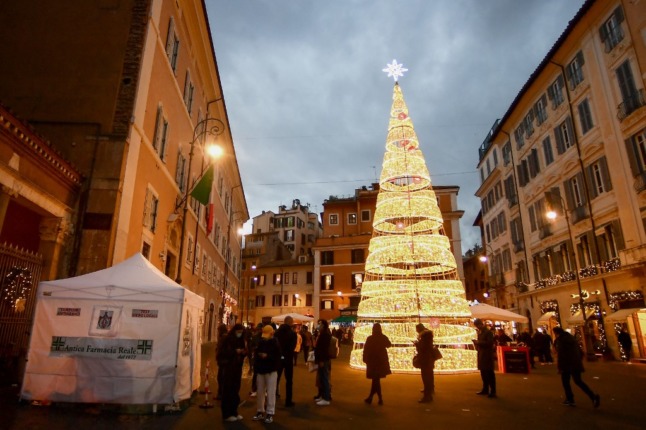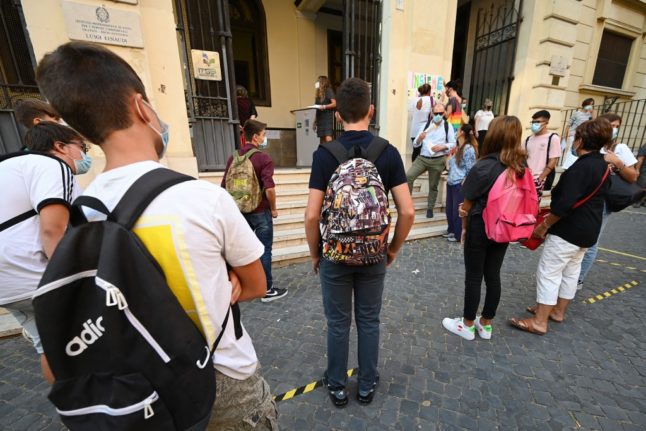This article was updated on December 27th
Italy’s government on Thursday night unanimously approved stricter rules on public gatherings and the use of health passes, with a new decree announced by Health Minister Roberto Speranza.
The decree has brought back the obligation to wear masks outdoors, temporarily banned public events and will also shorten the validity of Italy’s ‘green pass’ Covid health certificate.
READ ALSO: Covid-19: Italy makes outdoor mask wearing compulsory
While Speranza did not immediately state when the new rules would come into force, the government’s final decree published on Friday, December 24th (see the full text here in Italian) clarified that some changes were effective immediately as of Saturday and others set to come in during January and February.
Here’s a breakdown of what does (and doesn’t) change under the new decree, and when:
Gatherings and parties
- No public outdoor events – Outdoor public events and parties have been temporarily banned during the festive season, from December 25th-December 31st, after many local authorities had already chosen to cancel Christmas and New Year’s Eve events in towns and cities across the country.
- Nightlife – Nightclubs and dance venues will be closed immediately until January 31st.
- No limits on guests at home – Unlike last year, the decree does not set limits on the number of guests you can have at home for Christmas Eve dinner, Christmas Day lunch, Boxing Day or New Year’s Eve.
Green pass
- Extension of green pass rules in bars – Effective from December 25th, the government has extended the ‘reinforced’ or ‘super’ green pass requirement to bars and restaurants – including for bar service. Until now, ordering and consuming food and drinks at the bar has been allowed without any ‘green pass’ restrictions. The changes mean proof of vaccination or recovery from Covid-19 is now required even to drink coffee while standing at the counter.
- ‘Super’ green pass extension: Meanwhile, from January 10th the reinforced or ‘super’ green pass proving vaccination or recovery will become a requirement in more venues, including museums, gyms and swimming pools, team sports training venues, indoor wellness centres and spas (except for essential care and rehabilitative or therapeutic activities), cultural, social and recreational centres (excluding educational centres for children), theme and amusement parks, gambling halls, bingo halls and casinos.
- Green pass validity cut to six months – From February 1st, the validity of the ‘green pass’ health certificate is to be cut from nine months to six.
Masks
- Outdoor mask requirement – After discussions for many weeks, Italy has reintroduced the mandatory wearing of face masks in outdoor spaces, even in the lowest risk ‘white’ zones. The rule change is in force from December 25th until at least January 31st.
- FFP2 mask requirement – FFP2 face masks, which are more efficient than standard face masks, are required in certain venues including cinemas, theatres, sporting events and on public transport as of December 31st.
Vaccines
- Booster jabs after four months – From January 10th, booster jabs can be administered four months after the last dose instead of the current five months, confirmed Italy’s pandemic emergency commissioner on Monday.
- No vaccine mandate extension – The government had also discussed the possibility of extending the vaccination mandate to more state employees but this change was not approved. A vaccine obligation was extended to teachers, police and emergency services workers on December 15th and has applied to all healthcare workers since April.
Travel
- Random testing – The government hasn’t made many changes to travel – just one minor move to contain the spread of the virus in Italy. Anyone entering the country for tourism, work or any other reason may be asked to undergo random antigenic or molecular tests, with controls to be stepped up at ports, airports, stations and borders. In the case of a positive result, travellers will be placed in temporary isolation for a period of ten days. Anyone who tests positive and has no suitable accommodation can be required to stay in a Covid hotel at their own expense, according to the final decree text published on December 24th.
See the latest news and updates from The Local on Italy’s current Covid-19 health measures and travel restrictions.
For further details about Italy’s current Covid-19 health measures please see the Italian Health Ministry’s website (available in English).



 Please whitelist us to continue reading.
Please whitelist us to continue reading.
I was talking about what I learned in this article, and I really looked foolish, because the Green Pass information here is totally backward. The reduction in Green Pass validity *starts* on Feb. 1. (see https://www.dgc.gov.it/web/). Now, I believe in verifying information, but shouldn’t I be able to count on getting correct, crucial information from The Local?
Hi Ben,
The original version of this article stated repeatedly that the Italian government had not, at the time of writing, announced when the new measures would come in and that this was as yet unknown. So we’re not sure what incorrect information you’re referring to here.
The timing of the introduction of each change was not mentioned in the initial announcement, and only confirmed when the final decree text was published on December 24th. We have since updated the article with the new information.
Hi Clare,
Perhaps I had the misfortune of reading an interim version of the article with some combination of edits that produced the incorrect information.
Here is how the article read when I saw it (the update as of 24 December 2021 11:05 CET; I can send you the PDF if you’d like to examine it):
Here’s a breakdown of the changes, expected to be applied in the next few days and will cover the period until January 31st.
Gatherings and parties
Green pass
• Temporary extension of green pass rules in bars
• Green pass validity cut to six months – The validity of the ‘green pass’ health certificate is to be cut from nine months to six, and the reinforced or ‘super’ green pass proving vaccination or recovery will become a requirement in more venues, including museums, gyms and swimming pools, team sports training venues, indoor wellness centres and spas (except for essential care and rehabilitative or therapeutic activities), cultural, social and recreational centres (excluding educational centres for children), theme and amusement parks, gambling halls, bingo halls and casinos.
Does that make my confusion more clear?
Thank you for correcting the article later. I appreciate the Local’s service, but I hope you can understand why this was a disappointing moment.
The comments editor saw my “snips” as html tags and cut them out, but consider the ellipses to indicate cuts I made for brevity’s sake:
Gatherings and parties
…
Green pass
• Temporary extension of green pass rules in bars …
So the Green Pass expires six months after a. your last vax or b. feb 1? And then what? more shots, new pass, change of vax status? I’m old and so is my vax. What know?
So I am still a bit confused. I received my booster (3rd dose) in December and my wife got her 3rd dose in November.
Do we need a 4th dose for the summer? Can you even get a 4th dose?